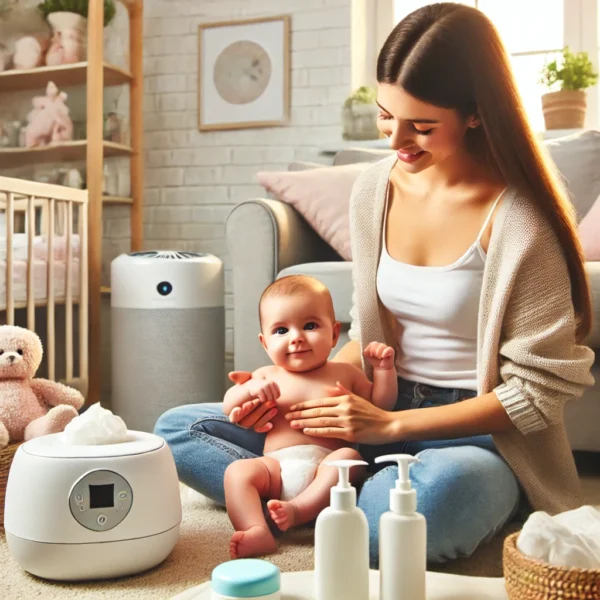Essential Tips for Caring for Babies with Allergies: A Guide to Comfort and Safety

Managing allergies in babies can be challenging, especially as their immune systems are still developing. From food sensitivities to skin and environmental allergies, a few strategies can help ease symptoms and create a safer, more comfortable environment for your baby. Here are essential tips for caring for babies with allergies:1. Identify and Avoid Allergens
- Observe Reactions: Keep an eye on any signs of allergies, such as skin rashes, digestive upset, difficulty breathing, or congestion after exposure to specific foods or environments. Note patterns and discuss any reactions with your pediatrician.
- Slow Introduction of New Foods: For babies starting solids, introduce one new food at a time over a period of several days. This makes it easier to spot food sensitivities or allergies. Common allergens include dairy, eggs, peanuts, tree nuts, soy, and wheat.
- Check for Cross-Contamination: If your baby has food allergies, avoid cross-contact by cleaning surfaces, utensils, and hands thoroughly. When purchasing pre-packaged foods, check labels for potential allergen exposure.
2. Breastfeeding or Special Formulas
- Breastfeeding Benefits: If possible, breastfeeding can help build a baby’s immune system and may lower the risk of developing allergies. However, allergens can pass through breast milk, so mothers may need to adjust their diet if they notice an allergic reaction.
- Hypoallergenic Formulas: For babies with cow’s milk protein allergies, consult a pediatrician for specialized formulas such as extensively hydrolyzed or amino acid-based formulas. These are formulated to be gentle on sensitive digestive systems.
3. Environmental Allergy Management
- Control Dust and Pet Dander: Use a vacuum with a HEPA filter, and keep your baby’s room clean and free of dust. For families with pets, try to limit the baby’s exposure to pet dander, and keep pets out of the baby’s sleeping area.
- Manage Mold and Humidity: Mold spores can worsen allergy symptoms. Use a dehumidifier in damp areas of your home and regularly check for mold around windows, bathrooms, and other moisture-prone areas.
- Pollen Precautions: If your baby has a pollen allergy, keep windows closed during high-pollen times, especially in the early morning. Regularly wash bedding and clothing to remove pollen that might have settled on fabrics.
4. Skin Allergies and Eczema Management
- Gentle Skincare Routine: Use fragrance-free, hypoallergenic baby soaps, lotions, and shampoos to avoid irritating your baby’s sensitive skin. Oatmeal-based creams can help soothe skin irritation.
- Moisturize Regularly: Babies with eczema or sensitive skin benefit from regular moisturizing. Apply a gentle, fragrance-free moisturizer immediately after bathing to lock in moisture and soothe dryness.
- Cool, Soft Clothing: Choose breathable, soft fabrics like cotton for baby clothing and bedding, as certain fabrics or rough materials can irritate sensitive skin.
5. Consult with a Pediatric Allergist
- Allergy Testing: If allergies are severe or persistent, a pediatric allergist can help identify specific allergens through testing. This can give parents a clearer picture of what to avoid.
- Medication Options: For some babies, a doctor may prescribe or recommend allergy medications, such as antihistamines or topical ointments for eczema, to relieve symptoms. These should only be used under medical supervision.
6. Keep an Allergy Action Plan
- Emergency Protocols: For severe food or environmental allergies, discuss with your healthcare provider how to handle an allergic reaction. They may suggest keeping an epinephrine auto-injector on hand if your baby is at risk for anaphylaxis.
- Communicate with Caregivers: Share your baby’s allergy information and emergency action plan with all caregivers, including family members, daycare providers, and babysitters. Ensure they know the signs of a reaction and how to respond.
7. Introduce Probiotics and Nutritional Support (if advised)
- Probiotic Benefits: Some studies suggest probiotics can support gut health and may reduce allergy risk in some babies. Discuss with your doctor before introducing any supplements.
- Ensure Balanced Nutrition: For babies with food allergies, work with a healthcare provider to ensure they’re receiving adequate nutrition. Alternatives, like fortified plant-based milk or special formulas, can help provide necessary nutrients.
8. Practice Patience and Self-Care
- Trial and Error: Allergy management often involves trial and error. Be patient, and remember that it may take time to identify triggers and find effective solutions.
- Take Breaks and Find Support: Caring for a baby with allergies can be stressful, so remember to take breaks when you can. Support groups for parents of allergic children can provide resources and comfort.
With careful management and support, many babies with allergies grow up healthy and thrive as they get older. Collaborating with healthcare professionals and taking proactive measures can make a significant difference in easing allergy symptoms and promoting your baby’s well-being.



